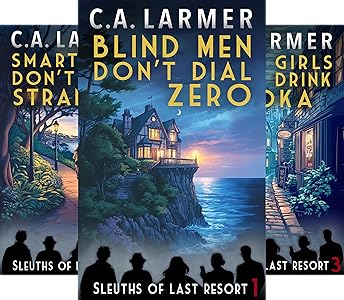It's a brave author who writes a lofty tome. If it's the size of War and Peace it had better be worthy of Tolstoy
There's a growing trend to publish novels as plump as encyclopedias, especially in the crime fiction department where I tend to loiter. While your average novel is about 350 pages*, or 70,000 to 100,000 words, I'm finding many murder mysteries are now batting well above the average, and not always with good reason.
Take three of the books currently on my bedside table:
• The Fall by Gilly Macmillan: 464 pages
• Marble Hall Murders by Anthony Horowitz: 579 pages
• The Ink Black Heart by Robert Galbraith (aka JK Rowling): 1,012 pages (gasp)
To date, I've finished one of the three (I won't say which one), and was bitterly disappointed. It took so long to wade through, the story unbearably slow and repetitive, I kept thinking I must have skipped back a few chapters. And by the time I finally got to the grand denouement, there was no rewarding climax. I'd long worked out whodunnit and was left with that hollow feeling I'd just wasted twenty+ hours of my life that I'd never get back. I mean, if you're gonna make me work for it, guys, it had better be worth the effort! And while I'm assured the other two are "brilliant!", I'm too skittish to start them, because what if they're not? Can I risk it?
The greater the reading time = the greater the expectation
In case you haven't worked it out, I have high expectations, a long TBR list, and the patience of a toddler. I'm also increasingly strapped for time and don't like wasting so much of it on lengthy books that don't live up. Because you can forgive a so-so short story but a long story? Not so much. Besides…
More words do not = a better book
Modern authors could learn a thing or two from the classics. Did you know, for instance, that J.D. Salinger's The Catcher in the Rye is around 73,000 words (that's roughly 240 pages*)? F. Scott Fitzgerald's The Great Gatsby sits at approx 47,000 words (or as little as 162 pages). And Ernest Hemingway's The Old Man and the Sea is lucky to fill 100 pages, at a meagre 27,000 words. And all are richer for it.
And don't start me on Agatha Christie. Her most popular, And Then There Were None, is just 54,000 words (or approx 250 pages), and yet remains the top-selling crime novel of all time. In fact, most of Christie's works are between 40,000 and 60,000 words, or under 200 pages, yet none feel too short or simplistic or "lacking".
But even if they were lacking, who cares? They didn't hog our time, our money or our headspace. That's why I'm a big fan of cheap and cheerful reads, like the sort you buy at the airport. A "quick read" offers a splash of entertainment without leaving us feeling drained, and sometimes that's all that's required. We don't always need or want Tolstoy, especially when it comes to the crime genre.
So what's the story with long books?
I wonder whether some publishers just get greedy. Many stories simply don't have the depth or plot or writing to sustain more than 280 pages, but on and on they dither, often repeating themselves or throwing in unncessary subplots, timelines, adjectives and/or characters, and I can only assume that's at the publisher's urging. Because the more it looks and feels like a weighty tome, the more they can charge for it and the more perceived "value for money". In a cost of living crisis that's gotta be a winner, right?
The problem is it's a false economy, especially for the author. Because if the reader feels ripped off (and they will if they've spent a lot of time and money on a disappointing book), it's the author who'll get poor reviews, less follow-up sales and may even be given the chop by the publisher. And yet it's the publisher who should have done the chopping long before the book ever reached the shelves. They should have gone for quality over quantity every single time.
But what if it's a BIG story?
I get it. Some tales are lofty and complicated and worth a thousand pages, and some writing is so exquisite you'll happily read forever. Tim Wnton's The Riders is a case in point. At roughly 380 pages or about 110,000 words, I never wanted it to end. Very often, however, less is more, and often "less" is the best way to deliver.
Like Harry Potter's adventures. We famously know that J.K. Rowling conjured the saga up while waiting on a train between Manchester and London. Now imagine if she had gone on to deliver that saga in one enormous book? That's over a million words, folks. Good luck getting the kiddies anywhere near that monster! Instead, Rowling smartly gave us shorter, bite-size installments that tasted great and left us salivating for more.Six more as it turns out, so it was a win-win for everybody, including Rowling, her publishers and their bottom line. (Pity Robert didn't follow her lead, hey? 
My "Harry Potter" moment
Now, I would never compare myself to Rowling, but I did have a moment to consider all this when I sat down to write Blind Men Don't Dial Zero, which turned out to be a massive story. (Most of my books are between 60,000 and 80,000 words, or around 280 pages, and with good reason. I'm in the "airport read" category, unashamedly. I want to give my readers fun, fast-paced puzzles. I'm not trying to be Rowling or Christie or—heaven forbid!—Tolstoy. See full selection at Amazon here.)
Yet Blind Men Don't Dial Zero didn't quite fall into that "quick-read" category. Not only did I have five complex "super sleuths" to explore but I had multiple twisty mysteries that needed a lot of time and space to unravel. So, instead of cramming it all into one absurdly long book, I split the story into three and turned it into a trilogy. The Sleuths of Last Resort trilogy, as it happens.
And I'm so glad I did. Book one introduces all the key players, not to mention some tantalising clues that will help in the follow-up books, and yet each one works on its own merits and acts as a stand-alone story. That way, if you don't get to Book 2 (Smart Girls Don't Trust Strangers) or Book 3 (Good Girls Don't Drink Vodka), it really doesn't matter. You should still feel pleasantly satisfied, or at least I hope you will. (You can check out this series for yourself at the links below, or via Amazon here.)
Either way, thanks for your time, folks. I know how valuable it is and I appreciate every precious minute of it.
Happy (satisfying) reading everyone!
xo Christina
*NB: Page numbers and word counts do vary significantly depending on page/font sizes, margins and editions. All sizes given are approximations

